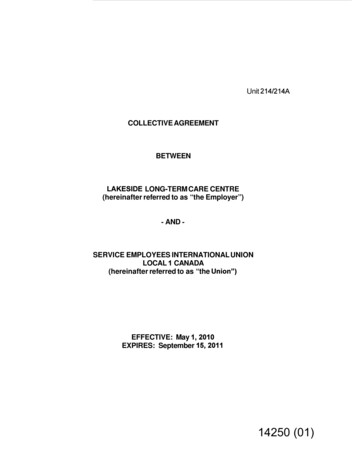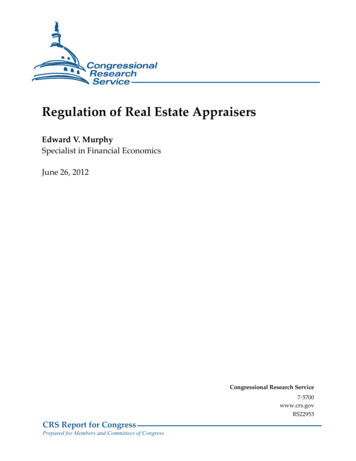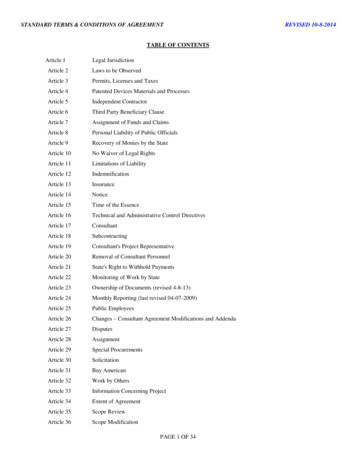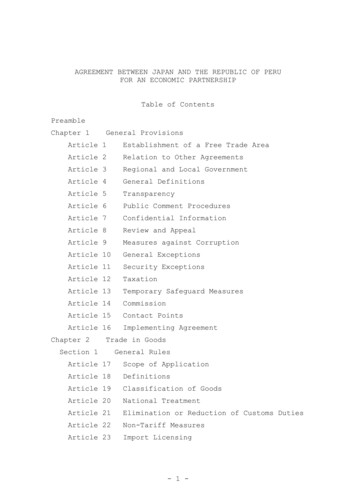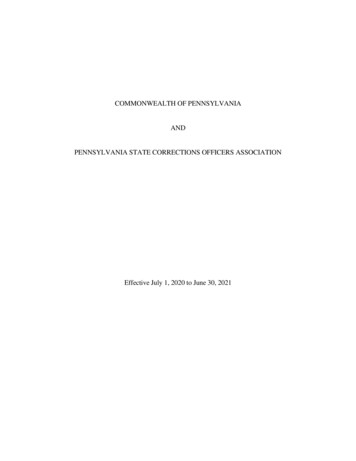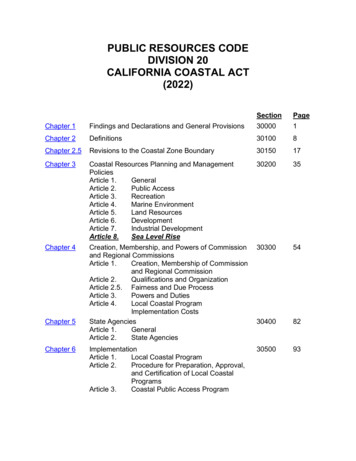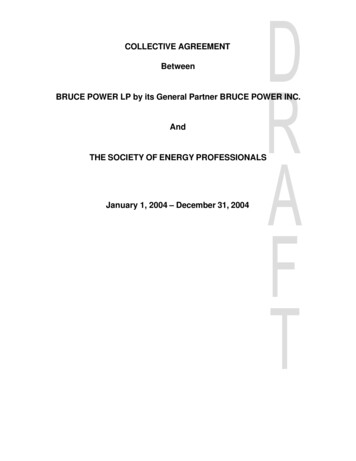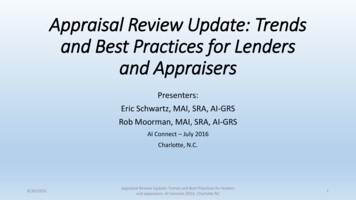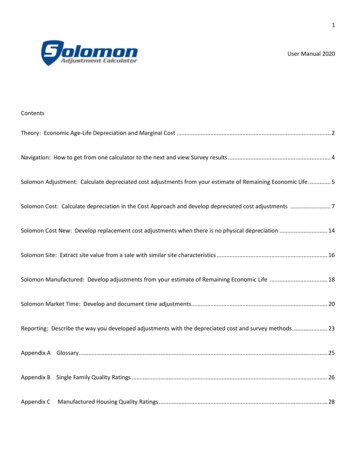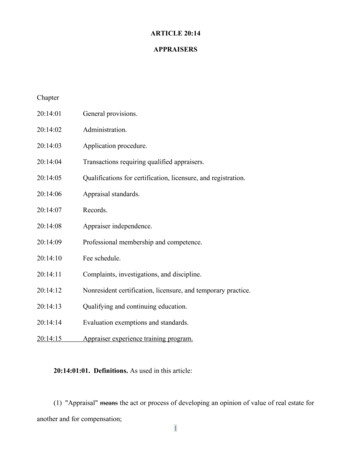
Transcription
ARTICLE 20:14APPRAISERSChapter20:14:01General ion procedure.20:14:04Transactions requiring qualified appraisers.20:14:05Qualifications for certification, licensure, and registration.20:14:06Appraisal standards.20:14:07Records.20:14:08Appraiser independence.20:14:09Professional membership and competence.20:14:10Fee schedule.20:14:11Complaints, investigations, and discipline.20:14:12Nonresident certification, licensure, and temporary practice.20:14:13Qualifying and continuing education.20:14:14Evaluation exemptions and standards.20:14:15Appraiser experience training program.20:14:01:01. Definitions. As used in this article:(1) "Appraisal" means the act or process of developing an opinion of value of real estate foranother and for compensation;1
(2) "Appraisal Foundation" means the Appraisal Foundation established on November 30,1987, as a not-for-profit corporation under the laws of Illinois;(3) "Appraiser Qualifications Board" means the independent board of the AppraisalFoundation which sets the qualification standards for appraisers;(4) "Appraisal Standards Board" means the independent board of the Appraisal Foundationwhich sets the appraisal standards for appraisers;(5) "Appraisal Subcommittee" means the Appraisal Subcommittee of the Federal FinancialInstitutions Examination Council;(6) "Appraiser" means a person who has been issued by the department a state-certifiedgeneral, state-certified residential, state-licensed, or state-registered appraiser credential to performappraisals;(7) “Bio-metric proctoring” continually verifying the identity of the student throughprocesses, such as facial recognition, consistency in keystroke cadence, or the observation of activityin the testing location;(7)(8) "Credential" means the certificate, license, or registration issued to a successfulapplicant for state-certified general appraiser, state-certified residential appraiser, state-licensedappraiser, or state-registered appraiser, as applicable;2
(8)(9) "Class hour" means 50 minutes out of each 60-minute segment;(9)(10) "Complex nonresidential property" means the nonresidential property to be appraised,the form of ownership, or market conditions are atypical;(10)(11) "Complex one- to four-family residential property" means the residential property tobe appraised, the form of ownership, or market conditions are atypical, as described in§ 20:14:04:09;(11)(12) "Department" means the Department of Labor and Regulation;(12)(13) "Distance education" means any education process based on the geographicalseparation of student and instructor;(13)(14) "Evaluation" means a valuation of real estate prepared for a federally insureddepository institution for a transaction that, pursuant to regulations promulgated by one or morefederal financial institution regulatory agencies, qualifies for the appraisal threshold exemption,business loan exemption, or subsequent transaction exemption;(14)(15) "Fed" means the Board of Governors of the Federal Reserve System;(15)(16) "Federal financial institutions regulatory agencies" means any of the following, asapplicable: the Board of Governors of the Federal Reserve System, the Federal Deposit InsuranceCorporation, the Office of the Comptroller of the Currency, or the National Credit UnionAdministration;3
(16)(17) "FDIC" means the Federal Deposit Insurance Corporation;(17)(18) "Financial institutions" means institutions regulated by the FDIC, OCC, Fed, andNational Credit Union Administration;(18)(19) "FIRREA" means the Financial Institutions Reform, Recovery, and EnforcementAct of 1989, as amended, Pub. L. No. 101-73 (August 9, 1989), 103 Stat. 183, 12 U.S.C. §§ 3311,3310 through 3351 as amended to July 21, 2010;(19)(20) "Guidelines" means the Interagency Appraisal and Evaluation Guidelines that wereissued by the federal financial institutions regulatory agencies and the Office of Thrift Supervisionon December 2, 2010;(20)(21) "OCC" means the Office of the Comptroller of the Currency, Treasury Department;(21)(22) "Real estate" means as defined in SDCL 36-21A-11;(22)(23) "Secretary" means the secretary of the department;(23)(24) "State-certified general appraiser" means an individual who has satisfied therequirements for the highest level of certification as a real estate appraiser as prescribed in thisarticle;4
(24)(25) "State-certified residential appraiser" means an individual who has satisfied therequirements for the highest level of residential certification as a real estate appraiser as prescribedin this article;(25)(26) "State-licensed appraiser" means an individual who has satisfied the requirementsfor mid-level licensure as a real estate appraiser as prescribed in this article;(26)(27) "State-registered appraiser" means an individual who has satisfied the requirementsfor entry-level registration as a real estate appraiser as prescribed in this article;(27)(28) "Tract development" means a project of five units or more that is constructed or isto be constructed as a single development;(28)(29) "Uniform standards" means Uniform Standards of Professional Appraisal Practice,as incorporated in § 20:14:06:01; and(29)(30) "Written examination" means an exam written on paper, or administeredelectronically on a computer workstation or other device.Source: 18 SDR 36, effective August 25, 1991; 19 SDR 12, effective August 3, 1992; 20 SDR9, effective August 1, 1993; 21 SDR 49, effective September 18, 1994; 22 SDR 91, effective January1, 1996; 23 SDR 113, effective January 12, 1997; 24 SDR 91, effective January 8, 1998; 25 SDR123, effective April 8, 1999; 26 SDR 120, effective March 27, 2000; 27 SDR 99, effective April 8,2001; 30 SDR 58, effective November 5, 2003; 32 SDR 109, effective December 27, 2005; 38 SDR5
116, effective January 10, 2012; 38 SDR 214, effective June 21, 2012; 44 SDR 27, effective August14, 2017; 46 SDR 75, effective December 4, 2019; 47 SDR 71, effective December 14, 2020.General Authority: SDCL 36-21B-3(2).Law Implemented: SDCL 1-47-14, 36-21B-1, 36-21B-3(2).Reference: Interagency Appraisal and Evaluation Guidelines, adopted December 2, 2010,Office of the Comptroller of the Currency (OCC), the Board of Governors of the Federal ReserveSystem (FRB), the Federal Deposit Insurance Corporation (FDIC), the Office of Thrift Supervision(OTS), and the National Credit Union Administration (NCUA). Copies may be obtained free ofcharge from tters/2010/fil10082a.pdf.CHAPTER 20:14:05QUALIFICATIONS FOR CERTIFICATION, LICENSURE, AND :05:01.01 Qualifications for certified or licensed appraisers that move to the state.20:14:05:01.02 Limited exemption for qualifications -- Military Repealed.20:14:05:02Examination.20:14:05:02.00 Examination approval -- Time limit.20:14:05:02.01 Experience requirements for state-registered appraiser.6
20:14:05:03Experience requirements for state-licensed appraiser.20:14:05:03.01 Experience requirements for state-certified residential appraiser.20:14:05:04Experience requirements for state-certified general appraiser.20:14:05:05Acceptable experience.20:14:05:05.01 Experience -- Review of appraisals by secretary.20:14:05:05.02 Experience -- Documentation requirements.20:14:05:05.03 Experience -- Time spent on the appraisal process.20:14:05:05.04 Experience -- Time limit.20:14:05:05.05 Experience -- Review of appraisals by secretary midway to upgrade.20:14:05:06Experience -- Verification.20:14:05:06.01 Educational requirements for state-registered appraiser.20:14:05:06.02 Education program for state-registered appraiser.20:14:05:07Educational requirements for state-licensed appraiser -- Appraiser education.20:14:05:07.01 Educational requirements for state-certified residential appraiser -- Appraisereducation.20:14:05:07.02 Educational requirements for state-certified residential appraiser -- Generaleducation.20:14:05:07.03 Repealed.20:14:05:07.04 Alternative to general education requirements of the state-certified residentialappraiser credential for state-licensed appraiser.20:14:05:08Educational requirements for state-certified general appraiser -- Appraisereducation.20:14:05:08.01 Educational requirements for state-certified general appraiser -- General education.20:14:05:08.02 Education -- Real estate degree.20:14:05:09Repealed.7
20:14:05:10Transferred.20:14:05:11Education -- Time limit.20:14:05:12Repealed.20:14:05:12.01 Substitution of :05:19Upgrade of le alternative appraisal experience.20:14:05:01.02. Limited exemption for qualifications -- Military. An applicant for statelicensed, state-certified residential, or state-certified general appraiser in the Reserve components ofthe U.S. Armed Forces, who was pursuing appraiser licensure or certification prior to December 1,2011, and who was called to active duty between December 1, 2011, and December 31, 2014, maysatisfy the qualifications required prior to July 1, 2014, for an additional time period after January1, 2015. The extension of time is equal to the applicant's time of active duty, plus an additional 12months Repealed.Source: 41 SDR 217, effective June 29, 2015.8
General Authority: SDCL 36-21B-3(1)(6).Law Implemented: SDCL 36-21B-1, 36-21B-3(1)(6).20:14:05:02. Examination. An applicant for a state-licensed, state-certified residential, orstate-certified general appraiser credential must have completed the education and experiencerequirements prescribed in this chapter prior to approval to sit for an Appraiser Qualifications BoardApproved Appraiser National Uniform Examination. An applicant for a state-registered appraisercredential shall have successfully completed the education prescribed in § 20:14:05:06.01 prior toapproval to sit for an examination prescribed by the secretary.An applicant for a state-certified general, state-certified residential, or state-licensed appraisercredential approved to take the National Uniform Appraiser Examination may take the examinationno more than four times. If an applicant does not pass the examination on the fourth attempt theapplication is no longer valid. The applicant may file a new application after a period of six monthsfrom the date of the fourth failed exam.Source: 18 SDR 36, effective August 25, 1991; 23 SDR 113, effective January 12, 1997; 32SDR 109, effective December 27, 2005; 38 SDR 116, effective January 10, 2012; 38 SDR 214,effective June 21, 2012; 44 SDR 27, effective August 14, 2017.General Authority: SDCL 36-21B-3(5).Law Implemented: SDCL 36-21B-3(5), 36-21B-4(3)36-21B1, 36-21B-3(5).Cross-References:State-certified general appraiser education, §§ 20:14:05:08 and 20:14:05:08.01.State-certified general appraiser experience, § 20:14:05:04.9
State-certified residential appraiser education, §§ 20:14:05:07.01 and 20:14:05:07.02 and20:14:05:07.03.State-certified residential appraiser experience, § 20:14:05:03.01.State-licensed appraiser education, §§ 20:14:05:07 and 20:14:05:07.01.State-licensed appraiser experience, § 20:14:05:03.State-registered appraiser education, § 20:14:05:06.01.20:14:05:02.00. Examination approval -- Time limit. An applicant for a state-certifiedgeneral, state-certified residential, or state-licensed appraiser credential approved to take theNational Uniform Appraiser Examination, or an applicant for a state-registered appraiser credentialapproved to complete the examination prescribed by the secretary, shall successfully complete theexamination within 24 months from the date of approval. If the applicant does not successfullycomplete the examination within the time limit under this section, the applicant may apply pursuantto § 20:14:03:01 and pay the application fee prescribed in § 20:14:10:01. The examination is validfor a period of 24 months from the date of successful completion.Source: 26 SDR 120, effective March 27, 2000; 32 SDR 109, effective December 27, 2005;34 SDR 67, effective September 11, 2007; 44 SDR 27, effective August 14, 2017; 46 SDR 75,effective December 4, 2019.General Authority: SDCL 36-21B-3(5).Law Implemented: SDCL 36-21B-3(5).10
20:14:05:05. Acceptable experience. Acceptable appraisal experience includes experiencein performingAny of the following is acceptable appraisal experience:(1) Appraisal;(2) Appraisal review;(3) Appraisal consulting; and(4) Mass appraisal.For a real estate lending officer or a real estate broker acceptable appraisal experience includesthe actual performance of a real estate appraisal or a professionalappraisal review of a real estateappraisal, as determined by the secretary.Case studies or practicum courses that are approved by the Appraiser Qualifications BoardCourse Approval Program or state appraiser regulatory agencies, and non-client appraisalexperience, may be used to satisfy the appraisal experience requirement. Case studies, practicumcourses, and non-client appraisal experience may not exceed 50 percent of the total experiencerequirement. Acceptable experience does not require that there be a client in a traditional sense (e.g.,a client hiring an appraiser for a business purpose) in order for an appraisal to qualify. Appraisalscompleted without a traditional client can meet any portion of the total experience requirement.Source: 18 SDR 36, effective August 25, 1991; 24 SDR 91, effective January 8, 1998; 32SDR 109, effective December 27, 2005; 32 SDR 109, adopted December 7, 2005, effective January1, 2008; 35 SDR 175, effective January 1, 2009; 40 SDR 121, effective January 7, 2014; 44 SDR27, effective August 14, 2017.General Authority: SDCL 36-21B-3(7)(1)(1)(17).11
Law Implemented: SDCL 36-21B-3(7)(17), 36-21B-1.20:14:05:21. Acceptable alternative appraisal experience. Experience obtained throughan alternative method other than the traditional supervisor and state-registered appraiser model mustsatisfy the experience requirements for state-licensed, state-certified residential, and state-certifiedgeneral appraiser credentials. Acceptable alternative methods for appraisal experience are:(1) Practicum courses that are approved by the Appraiser Qualifications Board CourseApproval Program or another state appraiser regulatory agency;(2) Practical Applications of Real Estate Appraisal (PAREA) programs approved by theAppraiser Qualifications Board Course Approval Program. Partial credit must not begranted for completing only a portion of a PAREA program. Experience credit must begranted upon verification of successful completion of an entire PAREA program for thestate-licensed or state-certified residential appraiser credential, as applicable; and(3) An experience training program administered in accordance with chapter 20:14:15.12
Source:General Authority: SDCL 36-21B-3(1)(21).Law Implemented: SDCL 36-21B-1, 36-21B-3(1)(21).Reference: The Real Property Appraiser Qualification Criteria and Interpretations ofthe Criteria, effective January 1, 2022, The Appraisal Foundation, Appraiser Qualifications is/TAF/Standards/Qualification Criteria/Qualification CriteriaRP /TAF/AQB RPAQC.aspx?hkey 5ec61b8d-751b-4a97-90b1-9b3dae51beea.CHAPTER 20:14:13QUALIFYING AND CONTINUING EDUCATIONSection20:14:13:01Continuing education requirements.13
20:14:13:01.01 Continuing education not required.20:14:13:01.02 Continuing education -- Partial requirement.20:14:13:02Acceptable continuing education course topics.20:14:13:02.01 Acceptable continuing education credit for field trips.20:14:13:03Minimum length of continuing education course.20:14:13:03.01 Requirement for qualifying education credit.20:14:13:03.02 Maximum length of classroom hours of instruction.20:14:13:04Additional activities eligible for continuing education credit.20:14:13:05Sources of qualifying education credit.20:14:13:05.01 Acceptable courses without state review.20:14:13:05.02 Acceptable distance education courses.20:14:13:05.03 Distance Asynchronous education -- Continuing education.20:14:13:05.04 Distance education -- Qualifying education.20:14:13:06Term of approval.20:14:13:07Application for course approval.20:14:13:08Approval of course changes.20:14:13:09Repealed.20:14:13:10Uniform standards training for instructors.20:14:13:10.01 Courses on the appraisal standards and ethics.20:14:13:11Certificate of attendance issued by course provider.20:14:13:12Disapproval or denial of a course.20:14:13:1320:14:13:14Training course for supervisory appraisers and state-registered appraisers.Course evaluation.14
20:14:13:02. Acceptable continuing education course topics. Credit may be granted Thedepartment shall grant credit to an applicant for renewal for courses that cover real estate topicsrelated to appraisal and that maintain or increase the an appraiser's skill, knowledge, and competencyin real property appraising, such as. Acceptable topics are those listed in this section or the equivalentas determined by the secretary:(1) Ad valorem taxation;(2) Arbitration, dispute resolution;(3) Courses related to practice of real estate appraisal or consulting;(4) Development cost estimating;(5) Ethics, standards of professional practice, and uniform standards;(6) Land use planning and zoning;(7) Real estate litigation, damages, and condemnation;(8) Management, leasing, and timesharing;(9) Property development and partial interest;(10) Real estate law, easements, and legal interest;(11) Real estate financing and investment;(12) Real estate appraisal-related computer applications;(13) Real estate securities and syndication;(14) Developing opinions of real property value in appraisals that also include personalproperty and/or business value;(15) Seller concessions and impact on value; and(16) Energy efficient items and "green building" appraisals.; and(17) Valuation bias, fair housing, or equal opportunity.15
Source: 18 SDR 36, effective August 25, 1991; transferred from § 20:14:05:14, 20 SDR 6,effective August 1, 1993; 23 SDR 113, effective January 12, 1997; 24 SDR 91, effective January 8,1998; 32 SDR 109, effective December 27, 2005; 38 SDR 214, effective June 21, 2012.General Authority: SDCL 36-21B-3(6).Law Implemented: SDCL 36-21B-3(6), 36-21B-1.20:14:13:05.01. Acceptable courses without state review. Education courses that havereceived approval by the Appraiser Qualifications Board of the Appraisal Foundation through theAppraiser Qualifications Course Approval Program or by the another state appraiser regulatoryagency may be accepted by the secretary without additional state review.Source: 25 SDR 123, effective April 8, 1999; 26 SDR 120, effective March 27, 2000; 32 SDR109, effective December 27, 2005; 34 SDR 67, effective September 11, 2007; 35 SDR 175, effectiveJanuary 1, 2009.General Authority: SDCL 36-21B-3(6).Law Implemented: SDCL 36-21B-1, 36-21B-3(6)20:14:13:05.02. Acceptable distance education courses. A An asynchronous distanceeducation course is acceptable for qualifying or continuing education if:(1) The course provides interaction. Interaction is a reciprocal environment where the studenthas verbal or written communication with the instructor;(2) Content approval is obtained from the Appraiser Qualifications Board, a state licensingjurisdiction, or an accredited college, community college, or university that offers distance education16
programs and is approved or accredited by the Commission on Colleges, a regional or nationalaccreditation association, or by an accrediting agency that is recognized by the U.S. Secretary ofEducation. Nonacademic credit college courses provided by a college must be approved by theAppraiser Qualifications Board or the state licensing jurisdiction; and(3) Course delivery mechanism approval is obtained from one of the following sources:(a) Appraiser Qualifications Board;(a)(b) Appraiser Qualifications Board approved Board-approved organizations providingapproval of course design and delivery, such as the Appraisal Foundation or other independentapproved entity; or(b)(c) A college or university that qualifies for content approval in subdivision (2) thatawards academic credit for the distance education course; or(c)(d) A qualifying college for content approval with a distance education deliveryprogram that approves the course design and delivery that incorporate interactivity.(4) Hybrid courses are courses that allow for both in-person and online (synchronous orasynchronous) interaction.A hybrid course is acceptable if:(a) In-person course sessions meet the defined class hour and is a source for educationcredit specified in § 20:14:13:05; and(b) Synchronous course sessions must meet the defined class hour and is a source foreducation credit specified in § 20:14:13:05; and(c) Asynchronous course sessions meet the class hour and is a source for education creditspecified in § 20:14:13:05 and this section.17
Source: 32 SDR 109, effective December 27, 2005.General Authority: SDCL 36-21B-3(6).Law Implemented: SDCL 36-21B-3(6).20:14:13:05.03. Distance Asynchronous education -- Continuing education. DistanceAsynchronous distance education courses intended for use as continuing education must include atleast one of the following:(1) A written examination proctored by an official approved by the college or university, orby the sponsoring organization. Remote proctoring, including bio-metric proctoring procedures, isacceptable; or(2) Successful completion of prescribed course mechanisms required to demonstrateknowledge of the subject matter.Source: 32 SDR 109, effective December 27, 2005.General Authority: SDCL 36-21B-3(6).Law Implemented: SDCL 36-21B-3(6), 36-21B-1.20:14:13:05.04. Distance education -- Qualifying education. Distance education coursesintended for use as qualifying education must include a written, closed-book final examination. Theexamination must be proctored in-person or remotely by an official approved by the college oruniversity, or by the sponsoring organization. Bio-metric proctoring is acceptable.Source: 34 SDR 67, effective September 11, 2007.18
General Authority: SDCL 36-21B-3(6).Law Implemented: SDCL 36-21B-1, 36-21B-3(6).CHAPTER 20:14:15APPAISER EXPERIENCE TRAINING PROGRAMSection20:14:15:01 Eligibility requirements.20:14:15:02 Experience training program application.20:14:15:03 Ranking system for candidate selection.20:14:15:04 Requirements to complete the experience portion of the program.20:14:15:05 Experience credit.20:14:15:06 Requirements to complete the education portion of the program.20:14:15:07 Grounds for dismissal from experience training program.20:14:15:08 Certificate of completion.20:14:15:09 Lead and associate trainer requirements.20:14:15:10 Agreement with department for other institutions to administer an experience trainingprogram.20:14:15:01. Eligibility requirements. To be eligible to enroll in the appraiser experiencetraining program the candidate must:19
(1) Possess a state-registered appraiser credential, in good standing, which includescompleting the educational requirements specified in § 20:14:05:06.01 and completingthe education program course, including the course examination, for state-registeredappraisers specified in § 20:14:05:06.02; and(2) Prior to enrollment, successfully complete the following hours of approved appraisertraining based upon the credential being sought:a. For candidates seeking the state-licensed or state-certified residential appraisercredential, the candidate must complete 60 hours of approved residentialappraiser education in the areas of:i. Residential market analysis and highest and best use – 15 hours;ii. Residential appraiser site valuation and cost approach – 15 hours; andiii. Residential sales comparison and income approaches – 30 hours.b. For candidates seeking the state-certified general appraiser credential, thecandidate must complete 150 hours of approved general appraiser education inthe areas of:i. General market analysis and highest and best use – 30 hours;ii. General sales comparison approach – 30 hours;iii. General income approach – 60 hours; andiv. General site valuation and cost approach – 30 hours.Source:General Authority: SDCL 36-21B-3(21).Law Implemented: SDCL 36-1B-1, 36-21B-3(21).20
20:14:15:02. Experience training program application. A candidate desiring toparticipate in the experience training program shall apply in writing on a form provided by thedepartment or institution administering the program. The application shall require, at a minimum,the following information:(1) Name;(2) Current business address, if applicable, and home address;(3) Email address and telephone number;(4) Driver’s license number and state of issuance;(5) Appraiser education currently completed;(6) Type of appraiser credential to be pursued;(7) Area of the state applicant intends to practice real estate appraisal;(8) College-level education currently completed, if applicable; and(9) A sworn declaration that must be signed by the applicant.Source:General Authority: SDCL 36-21B-3(6)(21).Law Implemented: SDCL 36-21B-1, 36-21B-3(6)(21).20:14:15:03. Ranking system for candidate selection.The program administrator shall review candidates for the experience training program according tothe following point system:(1) Resides in and intends to establish and maintain a real estate appraisal practice in a SouthDakota county with a population of 10,000 or less, 35 points;(2) Currently holds a state-registered appraiser credential, 20 points;(3) Has completed the applicable education prescribed in § 20:14:15:01, 15 points;21
(4) Understands the requirements, including tuition and travel, and commits in writing tocompleting the program, 10 points;(5) Holds a Bachelor’s degree required for the state-certified general appraiser credential orhas the college-level education required for the state-certified residential appraiser credential, asapplicable for the desired appraiser credential, [Note: If the candidate desires a state-licensedappraiser credential, college-level education is not required. The candidate will receive the allocatedpoints in this category.] 10 points; and(6) Possesses the required technology and equipment, 10 points.The program administrator shall select candidates with the highest point score for the program.Source:General Authority: SDCL 36-21B-3(6)(21).Law Implemented: SDCL 36-21B-1, 36-21B-3(6)(21).20:14:15:04. Requirements to complete the experience portion of the program.A candidate for the experience training program must complete the experience required for eachcredential level as agreed to in a memorandum of understanding between program administrator anddepartment.Source:General Authority: SDCL 36-21B-3(6)(21).Law Implemented: SDCL 36-21B-1, 36-21B-3(6)(21).20:14:15:05. Partial experience credit not allowed. The program administrator may notgrant a candidate partial experience for completing only a portion of an experience training program.22
Source:General Authority: SDCL 36-21B-3(6)(21).Law Implemented: SDCL 36-21B-1, 36-21B-3(6)(21).20:14:15:06. Requirements to complete the education portion of the program.A candidate for the experience training program must complete the Appraiser Qualification Board’srequired qualifying education for the desired credential as set forth in The Real Property AppraiserQualifications Criteria and Interpretations of the Criteria, which is incorporated by reference. Acandidate may obtain the required education while enrolled in the experience training program.Source:General Authority: SDCL 36-21B-3(6)(21).Law Implemented: SDCL 36-21B-1, 36-21B-3(6)(21).Reference: The Real Property Appraiser Qualification Criteria and Interpretations of theCriteria, effective January 1, 2022, The Appraisal Foundation, Appraiser Qualifications Board.Copies may be obtained from The Appraisal Foundation, free of charge ds/Qualification Criteria/Qualification CriteriaRP /TAF/AQB RPAQC.aspx?hkey 5ec61b8d-751b-4a97-90b1-9b3dae51beea20:14:15:07. Grounds for dismissal from experience training program. The departmentor institution administering the experience training program may dismiss a student for failure tocomply with the following requirements:(1) Attend all of the in-person and virtual classroom hours of instruction;(2) Participate in all of the field work that includes, but is not limited to, the following:(a) Property inspections;23
(b) Gathering market data; and(c) Working with local appraisers to develop geographic competency.(3) Complete all course assignments as prescribed in the course syllabus; and(4) Complete the Appraiser Qualifications Board-required qualifying education for thedesired credential in the timeframe set by the institution administering the program.In the case of an excused absence during the in-person or virtual classroom hours ofinstruction in subsection (1) above, the student must review the applicable recorded classroom orvirtual presentation for the training that was missed during the absence. In case of an excusedabsence for the scheduled field work in subsection (2) above, the student must complete the fieldwork independently.If a student is in noncompliance with the above course requirements, the lead trainer mustnotify the student, in writing, detailing the specific deficiencies. The lead trainer must grant thestudent 30 days in which the cited deficiencies must be corrected to avoid dismissal from theexperience training program.Source:General Authority: SDCL 36-21B-3(6)(21).Law Implemented: SDCL 36-21B-1, 36-21B-3(6)(21).20:14:15:08. Certificate of completion.The program administrator shall issue a certificate of completion to a candidate when the candidatesuccessfully completes the requirements
(12) "Real estate," as defined in SDCL 36-21A-11; (13) "Secondary mortgage market participant," a guarantor or insurer of mortgage-backed securities, or an underwriter or issuer of mortgage-backed securities. Secondary mortgage market participant only includes an individual investor in a mortgage -backed security if that investor
